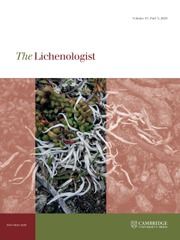Crossref Citations
This article has been cited by the following publications. This list is generated based on data provided by Crossref.
Hodkinson, Brendan P.
and
Hodkinson, Sarah Z.
2012.
Recent literature on lichens—224.
The Bryologist,
Vol. 115,
Issue. 1,
p.
183.
Kukwa, Martin
Schiefelbein, Ulf
and
Flakus, Adam
2013.
A Contribution to the Lichen Family Graphidaceae (ostropales, Ascomycota) of Bolivia.
Herzogia,
Vol. 26,
Issue. 2,
p.
231.
Neuwirth, Gerhard
Aptroot, André
and
Stocker-Wörgötter, Elfie
2016.
Hemithecium salacinicum, a New Species in the Family Graphidaceae (Lichenized Ascomycota: Ostropales) from Northern Thailand.
Herzogia,
Vol. 29,
Issue. 2,
p.
555.


